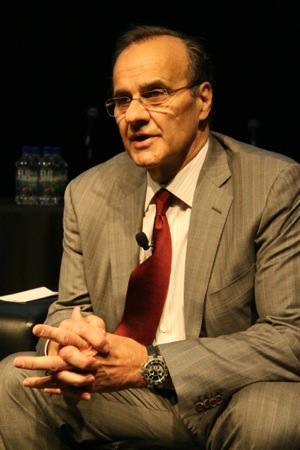Articles and News
BASEBALL LEGEND JOE TORRE TELLS JEWELERS: COMPETE AGAINST YOURSELF | February 02, 2012 (0 comments)

Scottsdale, AZ—Joe Torre, the legendary manager of both the New York Yankees and the Los Angeles Dodgers, was the opening keynote speaker for the 2012 Centurion Jewelry Show. In a rousing question-and-answer format, he told the audience the best path to outstanding success is to compete against yourself.
While he’s famous for having managed the multi-championship Yankees, Torre also spent time as a manager of the New York Mets. Lloyd Berger of Honora asked why one team had tremendous success with multiple division and World Series championships, while the other didn’t, and what was the difference? Both have players, both have fans, both are in New York—and two jewelry stores in the same town both have jewelry and customers.
Torre said the secret was that the Yankees always competed against themselves and against their own best past performances.
“When you have high expectations [from customers] and people come back to you, you have an obligation to them,” Torre said. He would tell his players they have a short window of opportunity in which to do this—you can borrow the talent but you can’t get the years back.

Legendary baseball player and manager Joe Torre relaxed and took questions from the audience during the Sunday morning keynote address at Centurion 2012.
The other thing Torre emphasized is to make every player—and every employee—feel they have an important contribution to make.
“Every single player will have a time when they are important, even if it’s one pinch hit at a critical time, or whatever,” he said.
Doug Sills of A. Link and Co. asked about working for the (late) legendary—and legendarily difficult—George Steinbrenner, who owned the team.
Torre replied, “I knew George was the boss, and I was gonna treat him with respect because he was the boss. Joe Garagiola once said, ‘When you take someone’s money, you’ve got to take their crap,’” though he joked that “crap” wasn’t the exact word the famous ballplayer had used.
But a technique he used successfully with Steinbrenner was disarmament. If the Yankees were in a slump, he would call and ask the boss what to do. It caught Steinbrenner off guard and he’d reply, “You’ll be okay.” Otherwise, said Torre, by waiting for Steinbrenner to call first, he might have had a much different, and far less pleasant, conversation.
“You don’t ‘handle’ a tough boss, you deal with a tough boss,” Torre told the audience. “But how you handle setbacks is what sets you apart. You can’t live in it, you have to learn from it and let it make you more determined that it won’t happen again.” If you live in it, it infects everyone around you.
David Abuloff of JB Star asked how Torre managed difficult players, not just a demanding boss.
“Make your players obligated to each other, not just to you,” he said. When faced with two star players—Darryl Strawberry and Cecil Fielder—and one open position in a particular game, he asked Strawberry his opinion. He said play Fielder. “I can handle sitting on the bench better than he can,” Strawberry told him. And the famous Alex Rodriguez (“A-Rod”), upon joining the Yankees, suddenly had to adjust to a lot of players whose talent was on a par with his. It was an adjustment for him, admitted Torre, but he did learn not to put so much stress on himself about carrying the team’s success.
But sometimes the personality is what it is, said Torre, and in that case if the player or employee doesn’t get it—and clearly doesn’t want to get it—they have to go.
Finally, when asked who the best player in baseball is now, that honor goes to Carlos Pujols.
Torre’s presentation segued neatly into a retailer panel discussion about managing a superstar employee. Moderated by Terry Chandler of the Diamond Council of America, the panel included Bruce Bucky of Hildgund with a chain of stores in Hawaiian luxury hotels, BJ Nichols of Reis Nichols in Indianapolis, and John Von Bargen of Von Bargens with four locations in Vermont and New Hampshire. The panel was evenly divided on its views about commission vs. straight salary, and a competitive vs. collaborative environment. Bucky, who has a background in the automotive industry, is a fan of the numbers-driven competitive environment, while Von Bargen took the opposite view and in fact converted his four stores from a numbers-driven plan to a collaborative approach. But all three retailers agreed that performance is key, and those that don’t measure up have to go.







